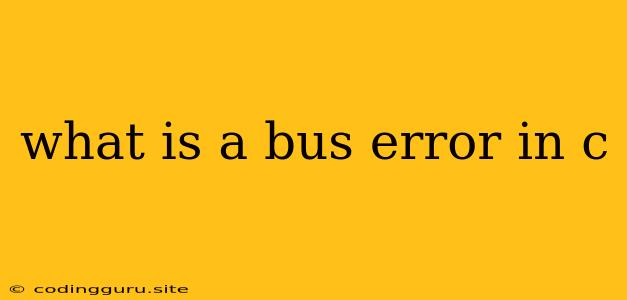What is a Bus Error in C?
Have you ever encountered a cryptic error message like "Bus error (core dumped)" while compiling or running your C program? This error can be quite frustrating, leaving you wondering what went wrong and how to fix it. This error message is a common signal that your program has run into a bus error.
But what exactly is a bus error, and why does it occur? Let's dive into the world of C programming and unravel the mysteries of this elusive error.
Understanding the Bus Error
The term "bus error" refers to an error that occurs when your C program attempts to access memory in an invalid way. Imagine the computer's memory as a series of streets (the bus) and your program as a delivery truck trying to reach a specific house (memory address). A bus error occurs when the truck tries to access a house that doesn't exist or is forbidden.
Think of the memory bus as a physical pathway for data transfer between different components in your computer system. The CPU uses the memory bus to read and write data to and from RAM (Random Access Memory).
Common Causes of a Bus Error
Now that you have a grasp of what a bus error is, let's examine the common culprits behind these errors:
- Invalid Memory Access: The most common cause is accessing memory addresses outside of the allocated space for your program. Imagine your program has been assigned a specific block of memory to work with. If it attempts to access an address outside that allocated block, a bus error occurs. This could happen when:
- Dereferencing a NULL pointer: Trying to access the data pointed to by a pointer that has a value of NULL.
- Accessing an array element outside its bounds: Attempting to read or write to an index that is beyond the limits of your array.
- Using a dangling pointer: A dangling pointer points to a memory location that has been freed but the pointer hasn't been reset.
- Segmentation Fault: This is a related error that indicates a violation of memory access rights. A segmentation fault occurs when your program tries to access a memory location that is protected.
- Hardware Issues: While rare, hardware problems like faulty memory modules or a failing motherboard can also lead to bus errors.
- External Factors: Rarely, external factors like external devices interfering with the memory bus could also cause a bus error.
Debugging Bus Errors
Debugging bus errors can be challenging, but here are some tips to help you track down the issue:
- Use a Debugger: A debugger is an invaluable tool for tracking down bus errors. It allows you to step through your code line by line and inspect variables and memory locations.
- Examine Your Code Carefully: Carefully review your code, focusing on memory access operations. Look for:
- Pointer errors: Make sure your pointers are initialized, not NULL, and they are pointing to valid memory locations.
- Array bounds: Ensure your program does not access array elements outside their bounds.
- Memory allocation and deallocation: Check for memory leaks or incorrect memory freeing operations.
- Use a Memory Debugger: A memory debugger can help you identify memory access violations, memory leaks, and other memory-related errors.
- Simplify Your Code: If you're having trouble finding the error, try simplifying your code by breaking it down into smaller parts.
- Check Your Hardware: If you suspect a hardware issue, run memory diagnostics to check for faulty RAM modules.
Examples of Bus Errors in C
Let's look at some code snippets that might trigger a bus error:
// Example 1: Dereferencing a NULL pointer
int *ptr = NULL;
int value = *ptr; // Accessing memory location pointed to by NULL pointer. This will cause a bus error.
// Example 2: Accessing an array element out of bounds
int arr[5];
arr[10] = 10; // Attempting to access arr[10], which is outside the array bounds.
// Example 3: Using a dangling pointer
int *ptr = malloc(sizeof(int));
*ptr = 10;
free(ptr); // The memory location pointed to by ptr has been freed.
*ptr = 20; // Attempting to write to a freed memory location, leading to a bus error.
Summary
Bus errors in C indicate a serious problem with memory access. Understanding the causes and learning how to debug these errors is crucial for writing reliable and stable programs.
Remember, meticulous code review, careful memory management, and utilizing debugging tools can help you tackle bus errors and prevent them from disrupting your projects.
